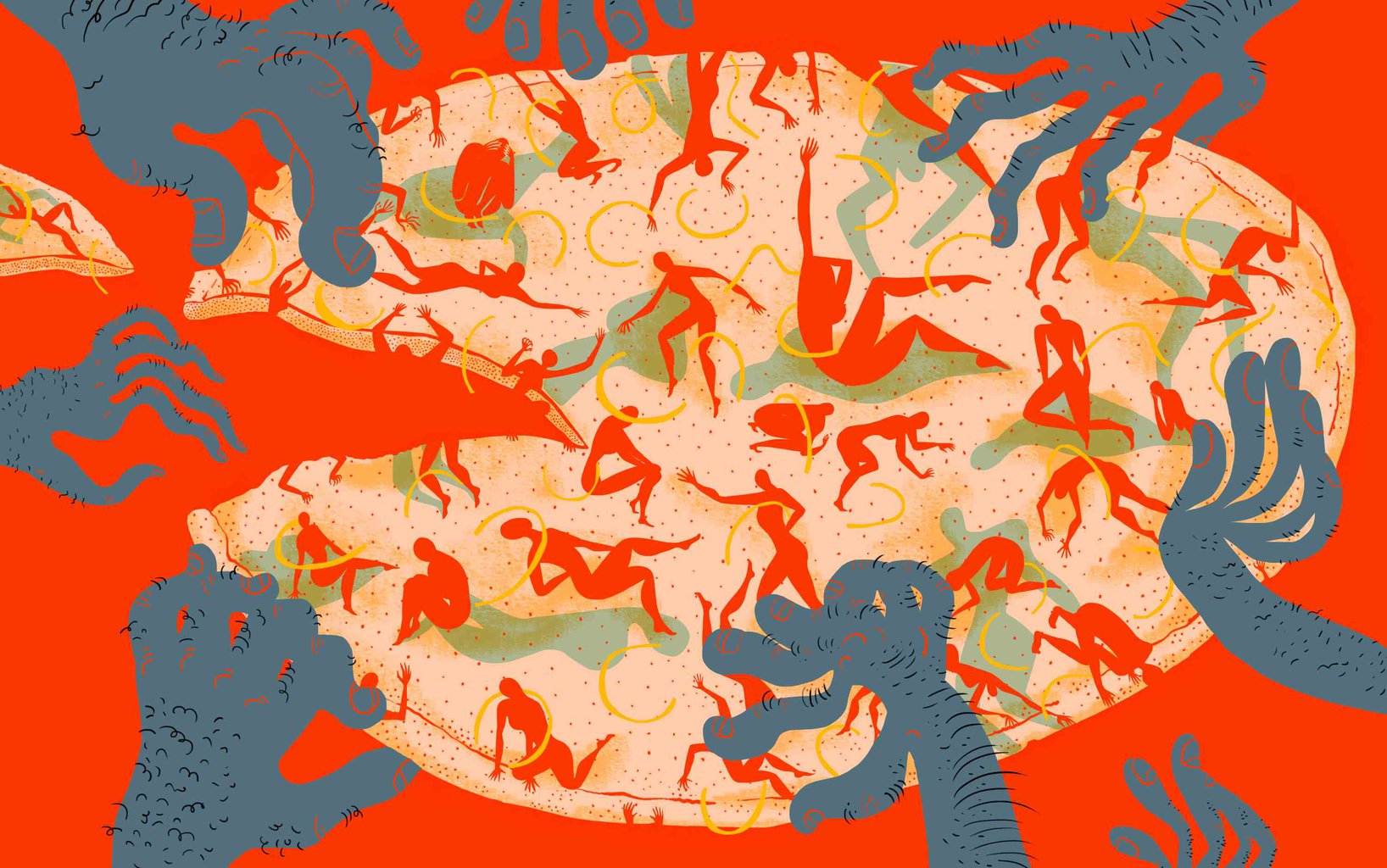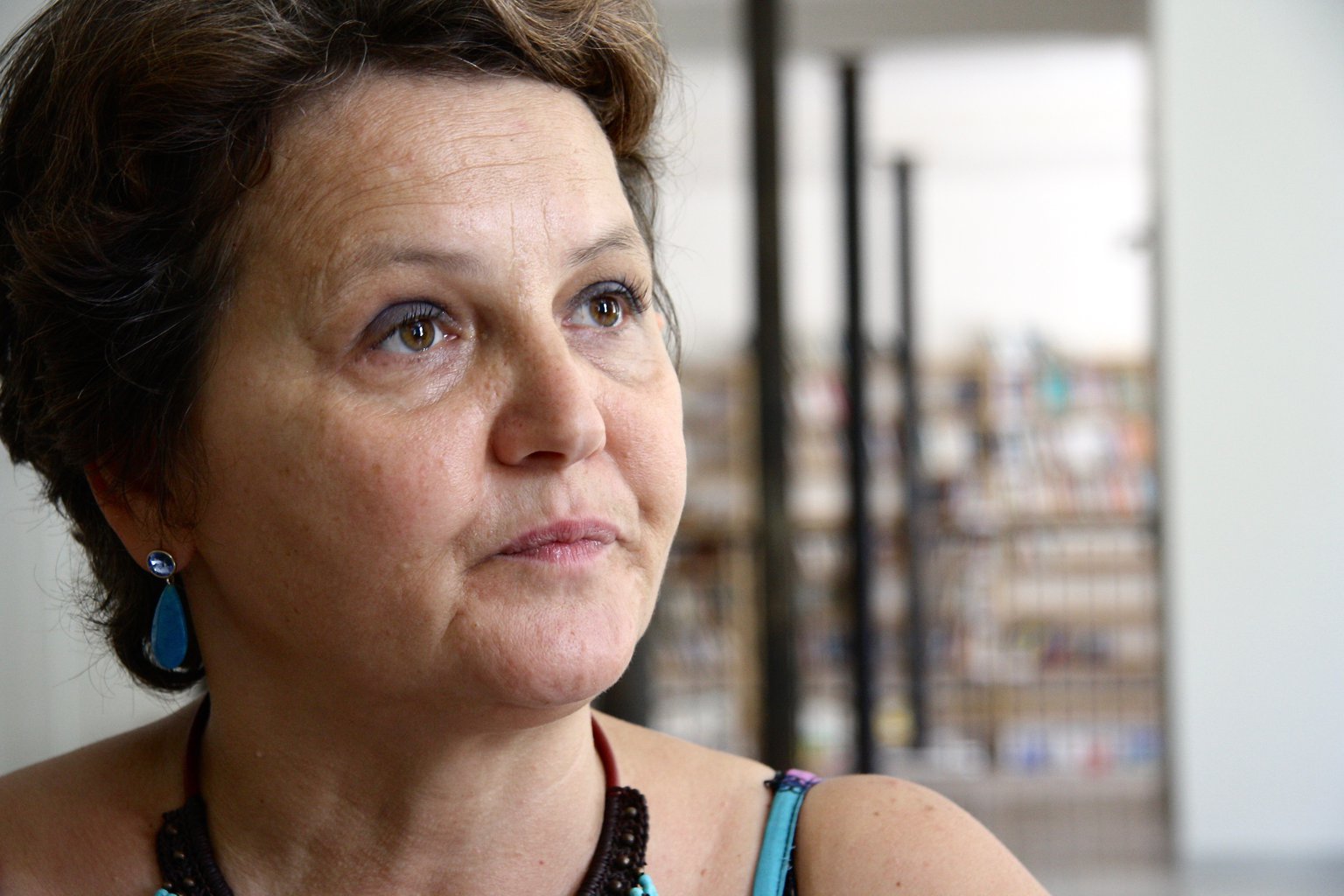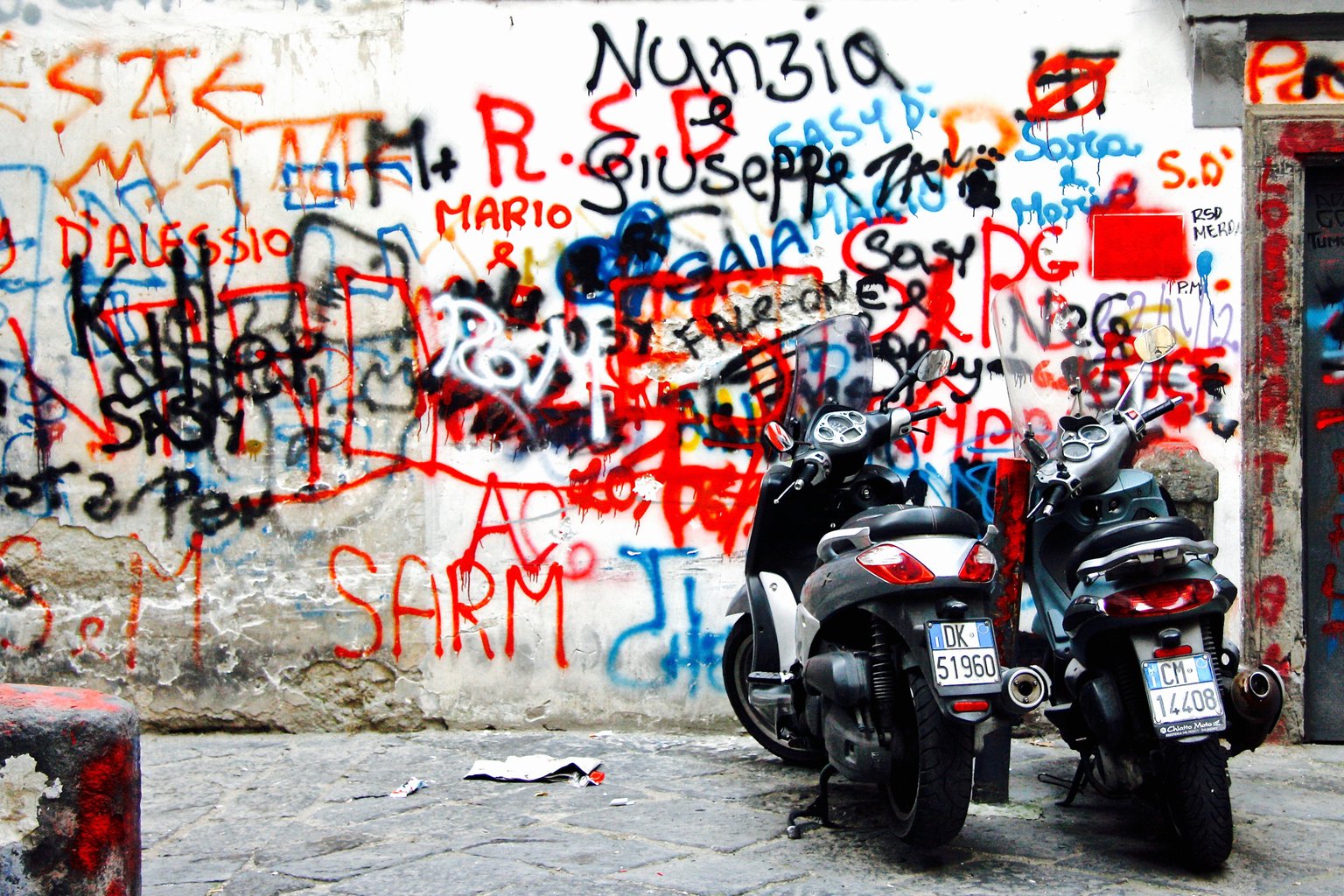Near the Garibaldi station in Naples, on the Via Galileo Ferraris, is a church with a cross illuminated in bright neon.
Outside stand short and stocky Chinese women, perched on the kerb, as though waiting for a cab.
Most are in their 40s, and some in their 50s. They are discreet, silent and holding cheap leather clutch bags. One is dressed in a prim shirt and trousers, with thick black-rimmed glasses, looking like a student on the town in search of a cheap eat.
All these women are prostitutes.
We pass the HQ of Italian energy company Enel. A long brick wall and an entrance gate, where a smart car is parked. Inside is a blonde transexual looking at herself in the rear-view mirror.
“The trans tend to stay in the cars,” says Carmen Farauanu, a Romanian outreach worker for social cooperative Dedalus.
49 year-old Carmen is from Bacau in east Romania. Short, with curly brown hair, she speaks Romanian with an Italian accent and, at first glance, would pass for a typical Moldavian housewife. But her business involves almost daily negotiations with the prostitutes and pimps of the Naples underground.
We drive to the ex-industrial core of the city - now empty lots, car parks and new office buildings, vacated at night. Here the women sit on plastic chairs at a distance of 50 to 100 metres from one another, occupying a corner, a bend in the road, or a lay-by.
Every girl has black heels with a platform toe, augmenting both height and poise. This is the signature accessory of east European prostitutes in Italy and Spain.
A Ukrainian woman from Donetsk waves from over the four-lane road to a Romanian on the other side.
“Nicoleta’s here!” she says, enthused at seeing her friend. “The blonde over here, the brunette over there!”
The blonde Ukrainian is in a short black dress, which clasp the thighs well above the knee, her face layered in mascara. She is drinking a blue energy drink from a plastic bottle. She has been working the street outside a derelict Italian warehouse for five years.
Carmen is clutching a wad of Primitex condoms. As she greets the Ukrainian with ‘Tesoro!’ [My treasure!], she takes the girl by the hand and passes her the fistful of prophylactics, as though they were nuggets of cannabis in a clandestine exchange.
The two women talk about paperwork. How to stay in Italy. Carmen says the procedures are complex, and take time: “But if you don’t create problems,” she says, “the police will leave you alone.”
On the other side of the road is Nicoleta [not her real name], hitting 25 years of age - from Calarasi, southwest Romania. She has a brown Louis Vuitton-esque bag, push-up bra and is looking to buy a flat in her hometown.
“Is 2,500 Euro for a studio flat a decent price?” she asks Carmen.
Nicoleta has a five year old child in Romania, and wants her mother to dump her drunk husband.
“She had a nightmarish life with him. She used to work in a clothing factory and had to support him as well,” she says. “I mean: who would hire him at 50?”
Nicoleta wants to send her mother some presents. One of the Roma from the nearby Romanian shanty-town will take it to her, when he goes home to Calarasi for August’s wedding season.
Right now, Nicoleta has issues in Italy. She is in trouble with the police in Naples, who accuse her of pimping another girl. An allegation she denies.
“When I see these girls, I often think: ‘My God, I was so lucky’”
Carmen came to work in Italy in 2000 when she was 32. She started out as a domestic, looking after an old couple for two years. When they died, she used her connections to get another job, before landing work in outreach with Dedalus.
She understands the situation women from Romania find themselves in: girls come to Italy and care for old people day and night, but the pensioners can die after two weeks - and the women have nowhere to live.
“In three or four days you’re by yourself, with no money, no papers, nothing. When you don’t know anyone, you’re starving, if you’re not very smart or you're desperate, and you don’t have time to know the language, a pimp will immediately pick you up. When I see these girls, I often think: ‘My God, I was so lucky’. Because it's very easy to slip into this.”
Outside the HQ of a political voting movement demanding absenteeism are painted words in giant letters ‘Non-Votare’. This is where a stocky late 30-someting Bulgarian stays with an Italian trans friend. The Bulgarian complains to Carmen that since she brought her three children to Italy, they have started misbehaving at school and at home. The trans shakes her head in concern.
Further down the street is a parade of giant inflatable toys. By day, a vendor sells these to seaside tourists. He has left the plastic ducks, sharks, dolphins and paddling pools on the street, confident no one will steal them. They are now the nocturnal backdrop to an Albanian in a push-up bra and miniskirt.
In an crossroads between two open plains is a mass of loud Nigerian women.
“They stay in groups,” says Carmen, “and have quick, sexual relations for as little as five Euro.”
Many are trafficked in loan shark scams, so are in debt at home in Nigeria. Once they pay their debts, they are free, so they trying to attract as many clients as possible.
“This takes them two to three years,” says Carmen.
The Nigerians are lowering the prices, and there is some tension among the other sex workers.
Another girl, Sara, also from Calarasi, stands under a flyover, below a sign warning drivers that if their vehicle is over 4.4 metres it will smack into the bridge overhead. Carmen talks to her. She says that once she owned a restaurant in Naples and wants to start this business again. Until then, she is looking forward to a vacation, somewhere in the Romanian mountains.
Under the flyover a battered Fiat is parked with its hazard lights on. A man in his late 50s, crouched, is waiting inside. Sara wants to talk. More. She won’t stop.
“Aren’t you worried you will lose clients?” asks Carmen.
“This one,” she gestures to the old man, “is used to waiting.”
“Normally you would have faith in your brother, if he tells you ‘Come to Italy’”
Carmen visits the street three times a week. When she began in 2009 there were mostly Albanians, and then came the Romanians, from the cities of Calarasi, Bucharest, Craiova and Bacau. The majority start working as prostitutes when they are 17, and many already have kids. The women earn up to 400 Euro per night.
“Most girls come from rural areas of Romania, from broken families,” says Carmen, “Lots of them grew up in an orphanage, or they lived through a history of violence with parents, but a few were raised in a well-structured family or went to a high school.”
In Italy, prostitution is tolerated, but exploitation is punished.
The pimps are Romanian, Albanian and Bulgarian. But most of the time they stick to their own nationality for prostitutes. They ‘buy’ a part of the street and fill them with girls.
The men target women with financial problems, who are lonely or without parents, or those with mental issues. In many cases, they promise them a place to work as a domestic or in a shop.
“I met people who told me ‘My cousin, my brother or my brother-in-law brought me here’,” says Carmen.
“Normally a girl would have faith, when her brother says ‘Come to Italy and you will find work as a babysitter.’ But after two weeks, she wakes up when he tells her: ‘we haven’t found work, because the employer has found someone else’.” Then he takes the girl to the streets.
“Others say clearly: come to prostitute, because you will make good money. But they never imagined that life on the street would be so bad. They thought it would be a game where they make love with one man and then another.”
In the 00s, Romanian prostitutes in Italy suffered gang rape, cigarette burns to the arms, and were regularly beaten up - but now they don't put up with this kind of treatment, says Vittoria Quondamatteo, a psychologist from Rome-based NGO “Il fiore del deserto”, who works with Romanian trafficking victims.
While Romanians have a heavy presence on the streets in Naples, around 60 per cent of prostitutes in Rome are from Romania, according to social co-operative Parsec.
“But girls don’t want to work for small amounts of money, they want to earn what an Italian works in a day,” adds Quondamatteo. “They need the latest smartphone and Ipad and they must have it at any cost. So it moves from forced prostitution to a career choice, where women offer a blow job for 50 Euro.”
Parents “sell” their kids to the streets
Over the last decade, Carmen has seen parents selling their kids on the street, and cases of small children - as young as five - for sale for sex. She gives an example of an 11 year-old boy, pimped by his parents.
The police caught the boy with a ‘client’. The child did not speak Romanian well and his parents were confused. They did not see that what happened between the kid and the abuser was a crime.
The child told the police officers:
“Until now, I didn’t do anything to the client - he just gave me ten Euro to pee on him.”
Prostitutes often deny their parents are involved in any way with their work, says Vittoria Quondamatteo.
“It is very difficult to work on this level, as there is an idealization of these parental figures, and the girls deny it: ‘my father did not know, my mother did not know, he was a family friend, but my parents did not know’ and sometimes, even sadder, children are accustomed to violence within the family and so violence is the only form of love they know."
Here she has a theory:
"Romanians who have been under such a strict regime [of Communism] have this inhibition of thought, so they say ‘it's like that and that's it’," she argues. "They have a strong ego and very little ability to get in touch with a deep emotional level.”
Romanian boys “dominate” gay sex market
As we turn the car near to the Garibaldi station, we are looking for boys. But it is hard to detect them. They do not dress provocatively. They dress just like boys. Jeans. Shorts. T-shirt. Or shirt. Trainers. Looking like they are on the town in search of girls. This is the style the male clients want.
Young Romanian men have been selling themselves in Naples since 2005. In most cases, they have sex with clients for a little bit of extra cash. They wash car windows in the day, meet an older man who makes a proposition, and take him up on the offer. A few are full-timers with their dedicated clients.
“The majority are adults, 16-17 years old,” says Carmen. “At 17 they are married and already have children. Many times they work in a couple: the man prostitutes on one street and his wife on another.”
A decade ago, the Romanian male prostitutes would not let themselves be penetrated by the client. Their refusal became so common, that a catchphrase became a kind of joke among clients in Rome and Naples - faccio solo l'attivo - ‘I only do active’. It was a way of the boys making themselves feel as though they were not gay.
But this has changed.
“Because the temptation is high,” says Carmen. “If you meet a person who has more extravagant pleasures, they will want boys to be passive - and they will pay more. For example, a sex act between men costs a minimum of 50 Euro. A girl makes 20. Men make more, because a girl, in an evening, can have ten clients. For a boy it’s tough to have ten assignations.”
In special cases, with male prostitution, the clients will pay 200 to 300 Euro for unprotected sex. Between men, this is also mixed with the consumption of illegal substances. There are also clients who pay Romanian boys only to have someone with whom to take drugs.
“The Romanian Roma males are deeply involved in prostitution,” says Andrea Morniroli, executive board member at Dedalus. “However, since there is also a strong anti-gay stigma, young men tend not to go to health services, for fear of being discovered as prostitutes within their community.
"We didn't know how to to convince them to go, so we worked on their wives. Without saying that their husbands were prostitutes, we told the women that some sexually transmitted diseases might affect their child. That's how the wives pulled their husbands by their ears to the doctor.”
Around 200 male prostitutes in Naples are from Romania, which is more than half of the male prostitutes in the city. This has caused some heartache.
“In Naples there is a great historical transsexual community, the culture of femminiello - of which there are 3,000 in Naples,” says Morniroli. “Those who are older than 50 years often fall in love with young Romanian boys. I mock them and tell them ‘oh well. at the end of the day, you're like a man in his 50s who loses his head over a young girl’. However the boys go to live in their home - and often take advantage of their hosts.”
“My kid thinks I’m working in a pizzeria”
We drive past the Palace of Justice and there is a girl at a bus stop in a pink top. She keeps her phone trapped in the lace just above her cleavage, and is pulling out a strip of chewing gum from her mouth.
“Business is slow because it’s the height of summer,” she says.
Another girl has arrived who needs money to send home to her kid in Romania.
Carmen is meeting her for the first time. She offers her some brochures on health issues, and unfolds another wad of Primitex, which she hands over.
“What are these for?” asks the girl.
“Condoms?” smiles Carmen. “What are condoms for?”
The girl takes the contraceptives and Carmen asks her name. They find out they are from the same town, and Carmen hands over her telephone number.
“When you need me, please call me,” she says, “and always remember when you had your last period!”
Another woman, in her 40s, very thin and with collapsing teeth, also from Calarasi and living in one of the favelas, is coughing on the street. She says business is very slow. She has TB.
Carmen asks all the women if they need a doctor or a gynaecological visit.
“I try to talk to them in a friendly way,” she says. “After that, the fact that you call them by their name is important. Slowly, you win their confidence. We’re here every week. Now the girls call me and I am fixed presence in the street. If my phone number passes from one girl to another, this is a good sign.”
When she goes to the doctor with the girls she usually has to wait for the appointment. This is when she ‘seizes the moment’ to talk to them.
“We’re talking about family and about other stuff. That’s where we connect, where I may have to tell her that ‘your friend is not really your friend’.”
Sometimes the pimps come with her and the girl to the hospital.
“If I see the pimp face to face, I tell him: ‘For you, it’s important for the woman to be healthy’.”
Carmen says the girls tell their parents they are not working on the street, but in restaurants.
“There is a girl who has her child here. The kid goes to school and she walks the street at night. I’m asking her: ‘What do you tell your kid?’ And she answers: ‘He thinks I’m working late at night in a pizzeria’.
“Now she’s concerned, because the child has grown up and begins to ask her questions like: ‘Why don’t you take me out for a pizza?’
“She’s thinking of taking her home to her mother in Romania, so she can come back to work here. Of course, her mother at home doesn’t know about her job. But all this, it comes at what price?”
Part of The Black Sea Eurocrimes project financed by Journalism Fund


